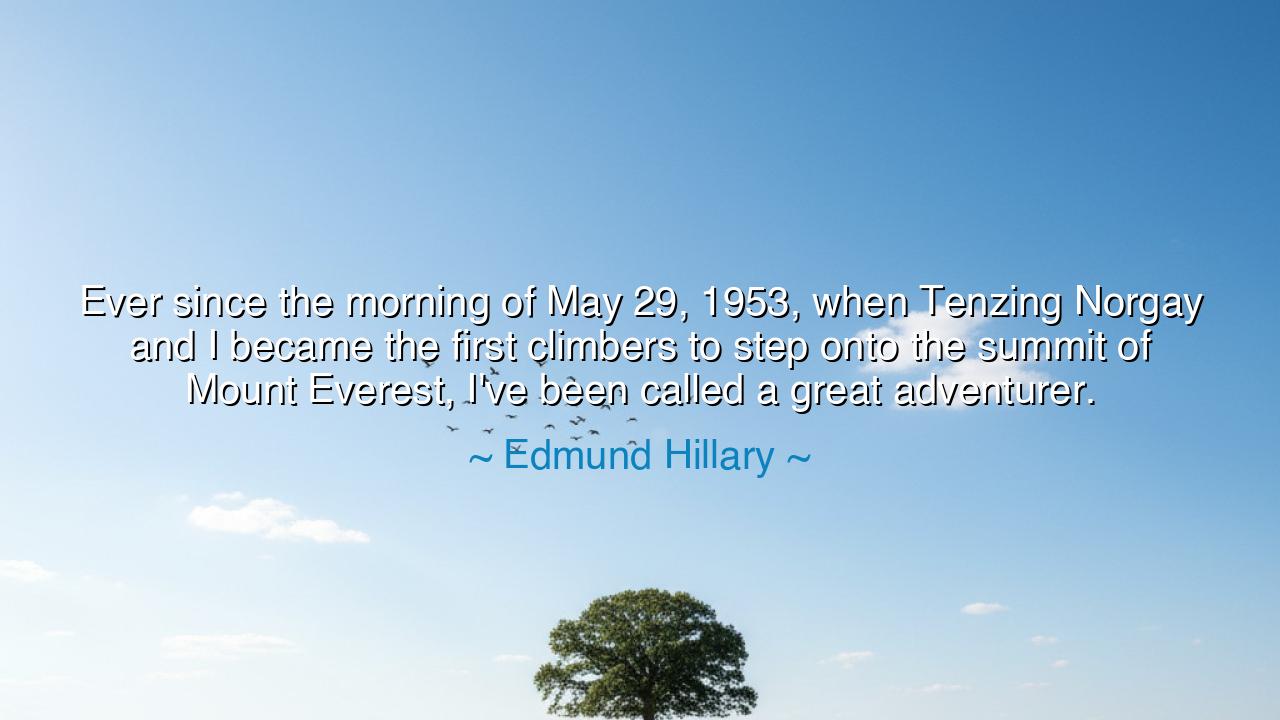
Ever since the morning of May 29, 1953, when Tenzing Norgay and
Ever since the morning of May 29, 1953, when Tenzing Norgay and I became the first climbers to step onto the summit of Mount Everest, I've been called a great adventurer.






On the lips of Sir Edmund Hillary there rests a memory turned into legend: “Ever since the morning of May 29, 1953, when Tenzing Norgay and I became the first climbers to step onto the summit of Mount Everest, I’ve been called a great adventurer.” These words are more than the recollection of a man—they are the echo of a day when humanity reached higher than ever before, when mortal feet pressed upon the roof of the world. Hillary’s voice carries both pride and humility, for though the world named him “a great adventurer,” he knew that the moment was forged not only by courage but by partnership, perseverance, and the elemental struggle between man and mountain.
The date itself—May 29, 1953—shines like a beacon in the chronicles of exploration. On that morning, beneath the thin air of Earth’s crown, two men stood where none had stood before. The world below was veiled in clouds, and above them, there was nothing left to conquer but the boundless sky. To Hillary and Tenzing, it was not simply victory, but survival: each step upward had been carved out of suffering, ice, exhaustion, and the nearness of death. The title “adventurer” was bestowed upon Hillary not merely because he climbed, but because he dared to enter the realm where human life itself struggles to endure.
Yet in this remembrance there is also a whisper of irony. Hillary says, “I’ve been called a great adventurer,” as though greatness were a garment laid upon his shoulders by others, not a mantle he claimed himself. This humility is the heart of the teaching. He knew that one does not become great by the name others give, but by the deeds themselves—the countless hours of preparation, the loyalty to a companion, the refusal to yield to despair. In this way, Hillary’s triumph mirrors that of Odysseus, whose wanderings became myth not because he proclaimed his own greatness, but because his endurance and cunning carved stories that others would tell for generations.
The essence of Hillary’s words lies in the balance between fame and truth. To the world, he became a symbol—the great adventurer who conquered Everest. But to Hillary himself, the climb was not conquest but a passage, a journey marked by fear, frost, and fellowship. He knew that the mountain was never truly conquered; it merely allowed him and Tenzing safe passage to its peak, before demanding they descend again or perish. Here lies the wisdom: the world often crowns us with titles, yet our true measure lies in how we walked the path, in the spirit we carried along the way.
This story is echoed in the tale of Neil Armstrong, who, upon stepping onto the moon in 1969, was hailed as a hero to all humankind. Yet Armstrong himself spoke with modesty, calling his act “a small step for man, a giant leap for mankind.” Like Hillary, he recognized that glory belongs not to the individual alone, but to the countless hands and hearts that made the journey possible, and to the indomitable spirit of exploration itself. Greatness, then, is not a crown one wears, but a light reflected from sacrifice, effort, and unity.
From Hillary’s words, let the listener draw this lesson: seek not to be called great, but to do what is great. Walk the path of courage, shoulder hardship with patience, and when your summit comes—whether it be in business, in family, in art, or in service—stand there with humility. Do not proclaim conquest, but gratitude: gratitude to those who climbed with you, gratitude to the challenges that sharpened you, gratitude to the heights themselves for allowing you to rise.
Practically, let each soul resolve this: face your mountains, however high, without trembling at the names others may give you. Prepare diligently, endure hardship, and lean on the strength of your companions. When you succeed, do not rest in the applause of the crowd, for applause fades like mist. Instead, rest in the knowledge that you were faithful to the climb, steady to the task, loyal to those who walked beside you. In this way, you too will become an “adventurer,” not because the world names you so, but because you dared to live fully and to rise above the plains of mediocrity.
Thus Hillary’s words stand not only as a memory of Everest, but as a timeless teaching: the summit is not the prize, but the proof—the proof of discipline, courage, humility, and endurance. And though the world may call you great, the true greatness is found in the climb itself.






AAdministratorAdministrator
Welcome, honored guests. Please leave a comment, we will respond soon